
Whist is a classic English trick-taking card game which was widely played in the 18th and 19th centuries. Although the rules are simple, there is scope for strategic play.
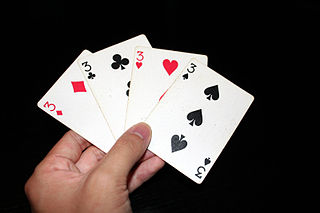
Gin rummy, or simply gin, is a two-player card game variant of rummy. It has enjoyed widespread popularity as both a social and a gambling game, especially during the mid twentieth century, and remains today one of the most widely-played two-player card games.
Seven-card stud, also known as Seven-Toed Pete or Down-The-River, is a variant of stud poker. Before the 2000s surge of popularity of Texas hold 'em, seven-card stud was one of the most widely played poker variants in home games across the United States and in casinos in the eastern part of the country. Although seven-card stud is not as common in casinos today, it is still played online. The game is commonly played with two to eight players, however, eight may require special rules for the last cards dealt if no players fold. Playing with nine players is possible.
In poker, the probability of each type of 5-card hand can be computed by calculating the proportion of hands of that type among all possible hands.
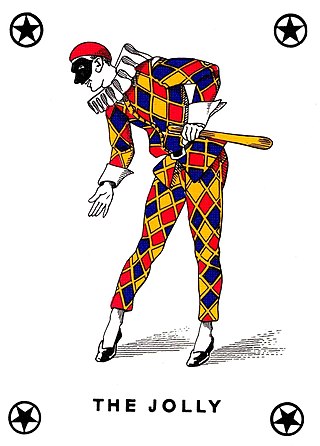
The Joker is a playing card found in most modern French-suited card decks, as an addition to the standard four suits. Since the second half of the 20th century, they have also been found in Spanish- and Italian-suited decks, excluding stripped decks.

Brag is an 18th century British card game, and the British national representative of the vying or "bluffing" family of gambling games. It is a descendant of the Elizabethan game of Primero and one of the several ancestors to poker, the modern version just varying in betting style and hand rankings. It has been described as the "longest-standing British representative of the Poker family."

James Butler Hickok, better known as "Wild Bill" Hickok, was a folk hero of the American Old West known for his life on the frontier as a soldier, scout, lawman, cattle rustler, gunslinger, gambler, showman, and actor, and for his involvement in many famous gunfights. He earned a great deal of notoriety in his own time, much of it bolstered by the many outlandish and often fabricated tales he told about himself. Some contemporaneous reports of his exploits are known to be fictitious, but they remain the basis of much of his fame and reputation.
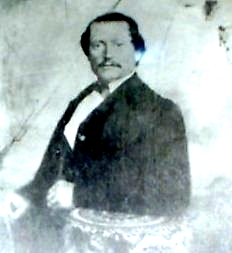
John McCall ;, also known as "Crooked Nose" or "Broken Nose Jack", was the murderer of Old West legend Wild Bill Hickok. McCall shot Hickok from behind as he played poker at Nuttal & Mann's Saloon in Deadwood, Dakota Territory, on August 2, 1876. McCall was executed for the murder on March 1, 1877.

The standard 52-card deck of French-suited playing cards is the most common pack of playing cards used today. In English-speaking countries it is the only traditional pack used for playing cards; in many countries of the world, however, it is used alongside other traditional, often older, standard packs with different suit systems such as those with German-, Italian-, Spanish- or Swiss suits. The most common pattern of French-suited cards worldwide and the only one commonly available in English-speaking countries is the English pattern pack. The second most common is the Belgian-Genoese pattern, designed in France, but whose use spread to Spain, Italy, the Ottoman Empire, the Balkans and much of North Africa and the Middle East. In addition to those, there are other major international and regional patterns including standard 52-card packs, for example, in Italy that use Italian-suited cards. In other regions, such as Spain and Switzerland, the traditional standard pack comprises 36, 40 or 48 cards.
Non-standard poker hands are hands which are not recognized by official poker rules but are made by house rules. Non-standard hands usually appear in games using wild cards or bugs. Other terms for nonstandard hands are special hands or freak hands. Because the hands are defined by house rules, the composition and ranking of these hands is subject to variation. Any player participating in a game with non-standard hands should be sure to determine the exact rules of the game before play begins.
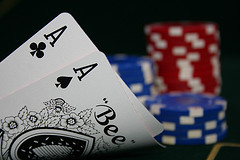
In Texas hold 'em, a starting hand consists of two hole cards, which belong solely to the player and remain hidden from the other players. Five community cards are also dealt into play. Betting begins before any of the community cards are exposed, and continues throughout the hand. The player's "playing hand", which will be compared against that of each competing player, is the best 5-card poker hand available from his two hole cards and the five community cards. Unless otherwise specified, here the term hand applies to the player's two hole cards, or starting hand.
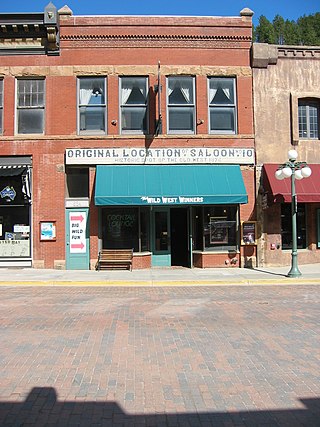
Nuttal & Mann's was a saloon located in Deadwood, southern Dakota Territory, North America. It was noted for being the death-place of James Butler "Wild Bill" Hickok. It was later renamed the "No. 10 Saloon". The current No. 10 Saloon is not at the same location as the original Nuttal & Mann's.

Poker dice are dice which, instead of having number pips, have representations of playing cards upon them. Poker dice have six sides, one each of an Ace, King, Queen, Jack, 10, and 9, and are used to form a poker hand.
The dead man's hand is a two-pair poker hand of "aces and eights" allegedly held by Wild Bill Hickok at the time of his murder.

The Hickok–Tutt shootout was a gunfight that occurred on July 21, 1865, in the town square of Springfield, Missouri between Wild Bill Hickok and gambler Davis Tutt. It is one of the few recorded instances in the Old West of a one-on-one pistol quick-draw duel in a public place, in the manner later made iconic by countless dime novels, radio dramas, and Western films such as High Noon. The first story of the shootout was detailed in an article in Harper's Magazine in 1867, making Hickok a household name and folk hero.
The following is a glossary of poker terms used in the card game of poker. It supplements the glossary of card game terms. Besides the terms listed here, there are thousands of common and uncommon poker slang terms. This is not intended to be a formal dictionary; precise usage details and multiple closely related senses are omitted here in favor of concise treatment of the basics.
Stud poker is any of a number of poker variants in which each player receives a mix of face-down and face-up cards dealt in multiple betting rounds. Stud games are also typically non-positional games, meaning that the player who bets first on each round may change from round to round. The cards dealt face down to each individual player are called hole cards, which gave rise to the common English expression ace in the hole for any hidden advantage.
Draw poker is any poker variant in which each player is dealt a complete hand before the first betting round, and then develops the hand for later rounds by replacing, or "drawing", cards.

The Old Style Saloon No. 10 is located in Deadwood, South Dakota, United States. The original location is best known as the site where the American Old West legend Wild Bill Hickok was assassinated by Jack McCall while playing a game of poker on August 2, 1876. Saloon No. 10 was originally located on placer claim number 10 from which its name is derived. Fire swept through the mining camp in 1879 destroying the original structure, and a bar was later built at its former location.












